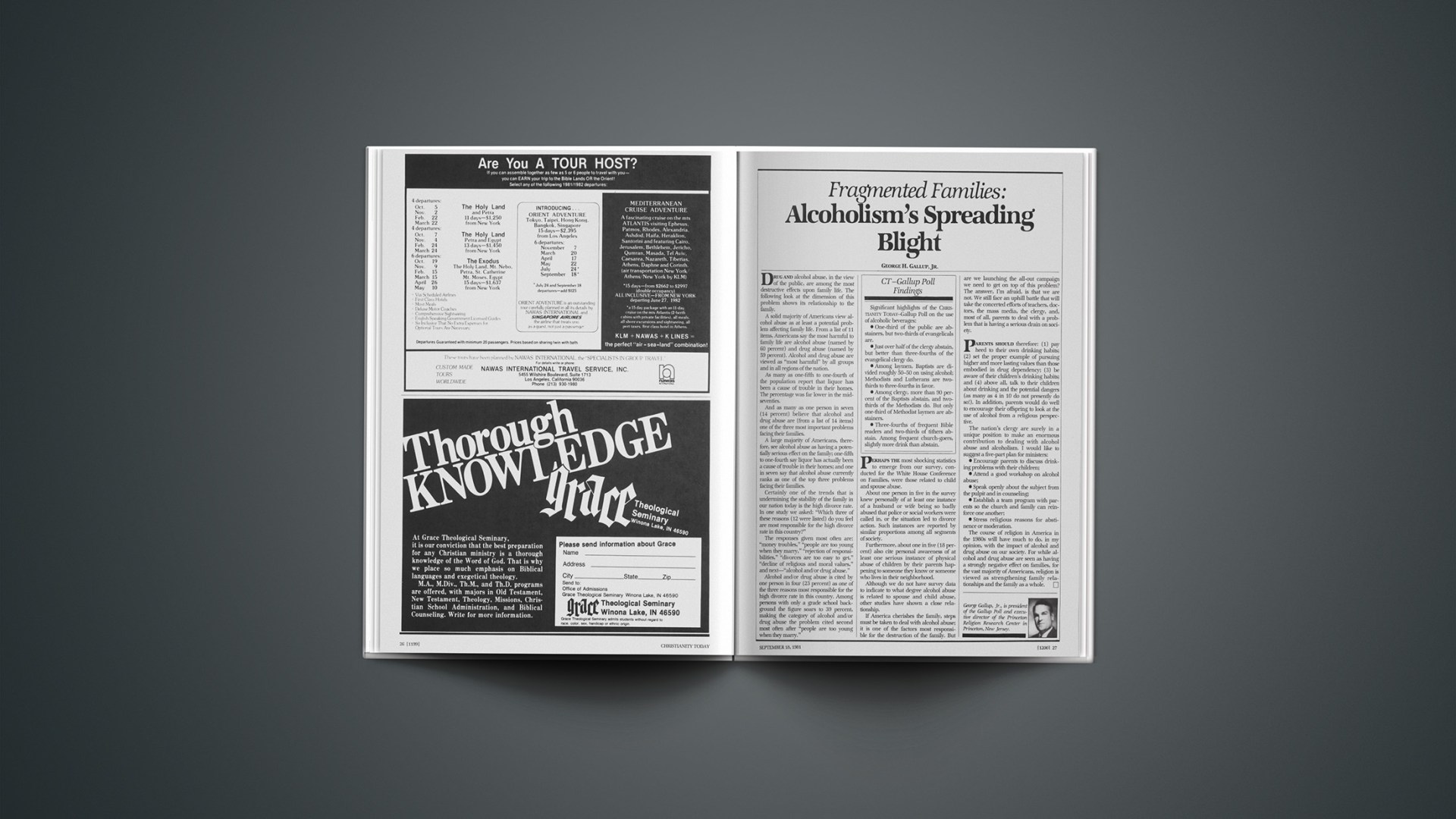Drug and alcohol abuse, in the view of the public, are among the most destructive effects upon family life. The following look at the dimension of this problem shows its relationship to the family.
A solid majority of Americans view alcohol abuse as at least a potential problem affecting family life. From a list of 11 items, Americans say the most harmful to family life are alcohol abuse (named by 60 percent) and drug abuse (named by 59 percent). Alcohol and drug abuse are viewed as “most harmful” by all groups and in all regions of the nation.
As many as one-fifth to one-fourth of the population report that liquor has been a cause of trouble in their homes. The percentage was far lower in the mid-seventies.
And as many as one person in seven (14 percent) believe that alcohol and drug abuse are (from a list of 14 items) one of the three most important problems facing their families.
A large majority of Americans, therefore, see alcohol abuse as having a potentially serious effect on the family; one-fifth to one-fourth say liquor has actually been a cause of trouble in their homes; and one in seven say that alcohol abuse currently ranks as one of the top three problems facing their families.
Certainly one of the trends that is undermining the stability of the family in our nation today is the high divorce rate. In one study we asked: “Which three of these reasons (12 were listed) do you feel are most responsible for the high divorce rate in this country?”
The responses given most often are: “money troubles,” “people are too young when they marry,” “rejection of responsibilities,” “divorces are too easy to get,” “decline of religious and moral values,” and next—“alcohol and/or drug abuse.”
Alcohol and/or drug abuse is cited by one person in four (23 percent) as one of the three reasons most responsible for the high divorce rate in this country. Among persons with only a grade school background the figure soars to 39 percent, making the category of alcohol and/or drug abuse the problem cited second most often after “people are too young when they marry.”
CT-Gallup Poll Findings
Significant highlights of the CHRISTIANITY TODAY-Gallup Poll on the use of alcoholic beverages:
• One-third of the public are abstainers, but two-thirds of evangelicals are.
• Just over half of the clergy abstain, but better than three-fourths of the evangelical clergy do.
• Among laymen, Baptists are divided roughly 50 on using alcohol; Methodists and Lutherans are two-thirds to three-fourths in favor.
• Among clergy, more than 90 percent of the Baptists abstain, and two-thirds of the Methodists do. But only one-third of Methodist laymen are abstainers.
• Three-fourths of frequent Bible readers and two-thirds of tithers abstain. Among frequent church-goers, slightly more drink than abstain.
Perhaps the most shocking statistics to emerge from our survey, conducted for the White House Conference on Families, were those related to child and spouse abuse.
About one person in five in the survey knew personally of at least one instance of a husband or wife being so badly abused that police or social workers were called in, or the situation led to divorce action. Such instances are reported by similar proportions among all segments of society.
Furthermore, about one in five (18 percent) also cite personal awareness of at least one serious instance of physical abuse of children by their parents happening to someone they know or someone who lives in their neighborhood.
Although we do not have survey data to indicate to what degree alcohol abuse is related to spouse and child abuse, other studies have shown a close relationship.
If America cherishes the family, steps must be taken to deal with alcohol abuse; it is one of the factors most responsible for the destruction of the family. But are we launching the all-out campaign we need to get on top of this problem? The answer, I’m afraid, is that we are not. We still face an uphill battle that will take the concerted efforts of teachers, doctors, the mass media, the clergy, and, most of all, parents to deal with a problem that is having a serious drain on society.
Parents should therefore: (1) pay heed to their own drinking habits; (2) set the proper example of pursuing higher and more lasting values than those embodied in drug dependency; (3) be aware of their children’s drinking habits; and (4) above all, talk to their children about drinking and the potential dangers (as many as 4 in 10 do not presently do so!). In addition, parents would do well to encourage their offspring to look at the use of alcohol from a religious perspective.
The nation’s clergy are surely in a unique position to make an enormous contribution to dealing with alcohol abuse and alcoholism. I would like to suggest a five-part plan for ministers:
• Encourage parents to discuss drinking problems with their children;
• Attend a good workshop on alcohol abuse;
• Speak openly about the subject from the pulpit and in counseling;
• Establish a team program with parents so the church and family can reinforce one another;
• Stress religious reasons for abstinence or moderation.
The course of religion in America in the 1980s will have much to do, in my opinion, with the impact of alcohol and drug abuse on our society. For while alcohol and drug abuse are seen as having a strongly negative effect on families, for the vast majority of Americans, religion is viewed as strengthening family relationships and the family as a whole.










